Importance of recovery-oriented Mental-Health Care
VerifiedAdded on 2022/08/28
|8
|2068
|17
AI Summary
Contribute Materials
Your contribution can guide someone’s learning journey. Share your
documents today.
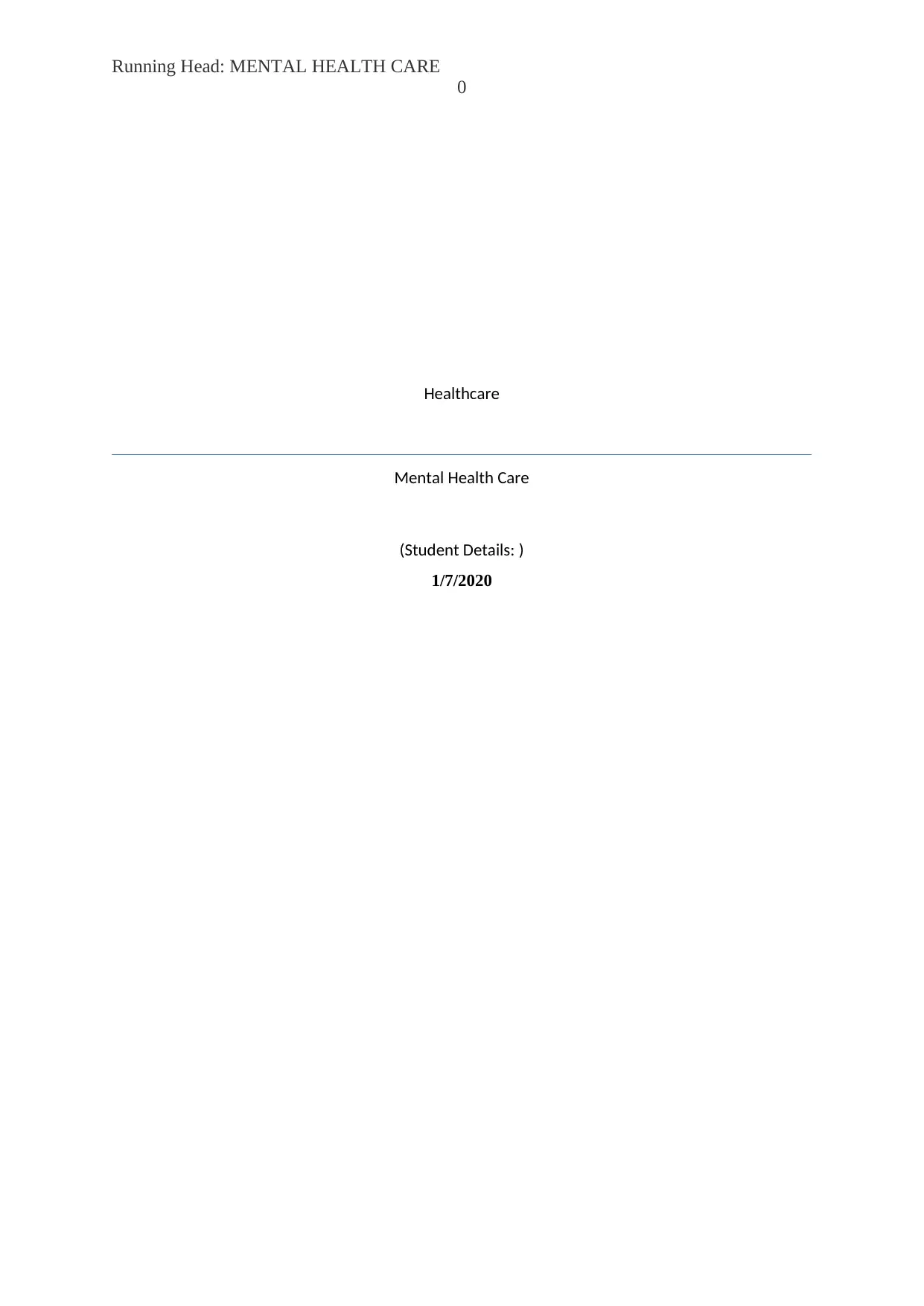
Running Head: MENTAL HEALTH CARE
0
Healthcare
Mental Health Care
(Student Details: )
1/7/2020
0
Healthcare
Mental Health Care
(Student Details: )
1/7/2020
Secure Best Marks with AI Grader
Need help grading? Try our AI Grader for instant feedback on your assignments.
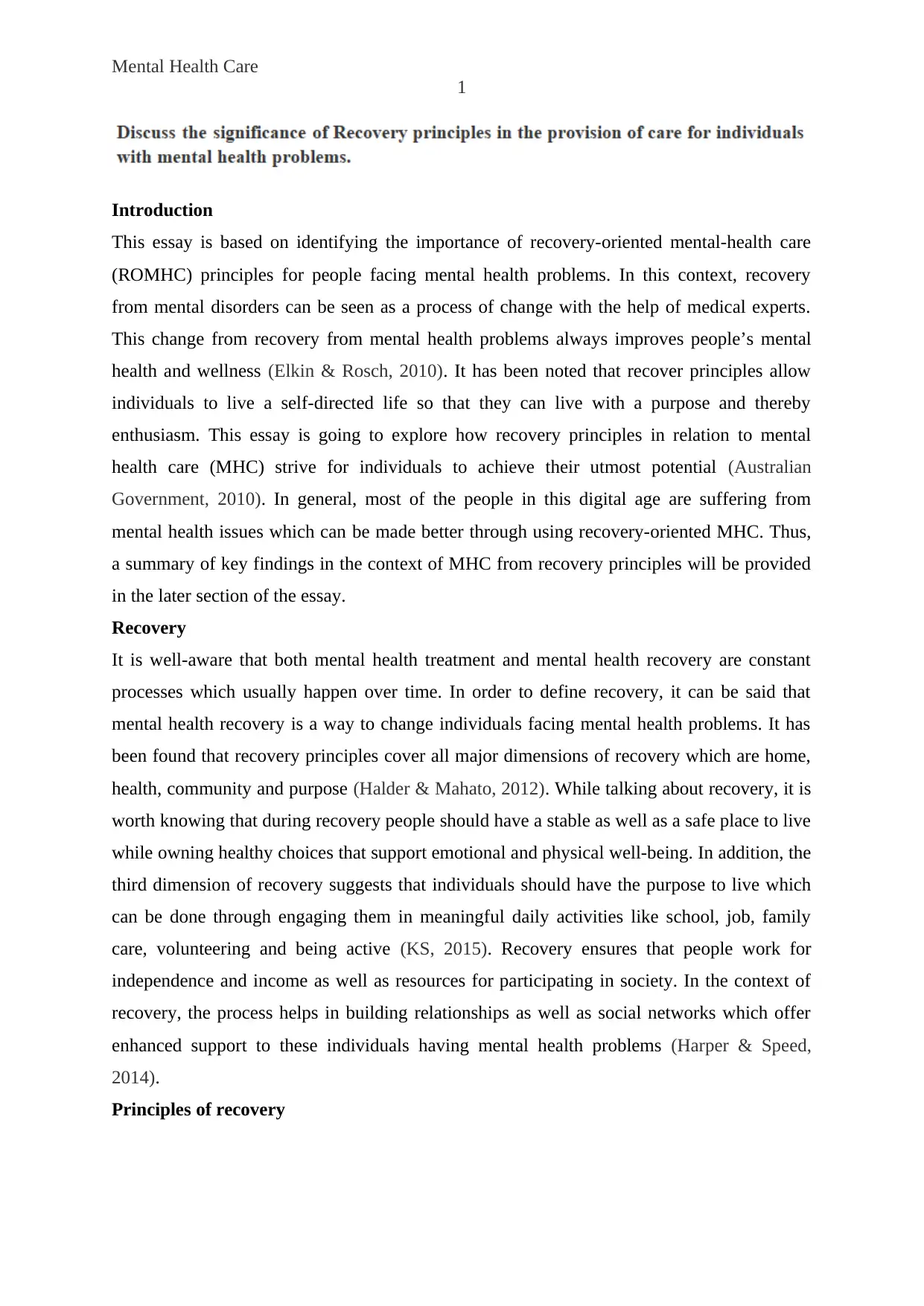
Mental Health Care
1
Introduction
This essay is based on identifying the importance of recovery-oriented mental-health care
(ROMHC) principles for people facing mental health problems. In this context, recovery
from mental disorders can be seen as a process of change with the help of medical experts.
This change from recovery from mental health problems always improves people’s mental
health and wellness (Elkin & Rosch, 2010). It has been noted that recover principles allow
individuals to live a self-directed life so that they can live with a purpose and thereby
enthusiasm. This essay is going to explore how recovery principles in relation to mental
health care (MHC) strive for individuals to achieve their utmost potential (Australian
Government, 2010). In general, most of the people in this digital age are suffering from
mental health issues which can be made better through using recovery-oriented MHC. Thus,
a summary of key findings in the context of MHC from recovery principles will be provided
in the later section of the essay.
Recovery
It is well-aware that both mental health treatment and mental health recovery are constant
processes which usually happen over time. In order to define recovery, it can be said that
mental health recovery is a way to change individuals facing mental health problems. It has
been found that recovery principles cover all major dimensions of recovery which are home,
health, community and purpose (Halder & Mahato, 2012). While talking about recovery, it is
worth knowing that during recovery people should have a stable as well as a safe place to live
while owning healthy choices that support emotional and physical well-being. In addition, the
third dimension of recovery suggests that individuals should have the purpose to live which
can be done through engaging them in meaningful daily activities like school, job, family
care, volunteering and being active (KS, 2015). Recovery ensures that people work for
independence and income as well as resources for participating in society. In the context of
recovery, the process helps in building relationships as well as social networks which offer
enhanced support to these individuals having mental health problems (Harper & Speed,
2014).
Principles of recovery
1
Introduction
This essay is based on identifying the importance of recovery-oriented mental-health care
(ROMHC) principles for people facing mental health problems. In this context, recovery
from mental disorders can be seen as a process of change with the help of medical experts.
This change from recovery from mental health problems always improves people’s mental
health and wellness (Elkin & Rosch, 2010). It has been noted that recover principles allow
individuals to live a self-directed life so that they can live with a purpose and thereby
enthusiasm. This essay is going to explore how recovery principles in relation to mental
health care (MHC) strive for individuals to achieve their utmost potential (Australian
Government, 2010). In general, most of the people in this digital age are suffering from
mental health issues which can be made better through using recovery-oriented MHC. Thus,
a summary of key findings in the context of MHC from recovery principles will be provided
in the later section of the essay.
Recovery
It is well-aware that both mental health treatment and mental health recovery are constant
processes which usually happen over time. In order to define recovery, it can be said that
mental health recovery is a way to change individuals facing mental health problems. It has
been found that recovery principles cover all major dimensions of recovery which are home,
health, community and purpose (Halder & Mahato, 2012). While talking about recovery, it is
worth knowing that during recovery people should have a stable as well as a safe place to live
while owning healthy choices that support emotional and physical well-being. In addition, the
third dimension of recovery suggests that individuals should have the purpose to live which
can be done through engaging them in meaningful daily activities like school, job, family
care, volunteering and being active (KS, 2015). Recovery ensures that people work for
independence and income as well as resources for participating in society. In the context of
recovery, the process helps in building relationships as well as social networks which offer
enhanced support to these individuals having mental health problems (Harper & Speed,
2014).
Principles of recovery
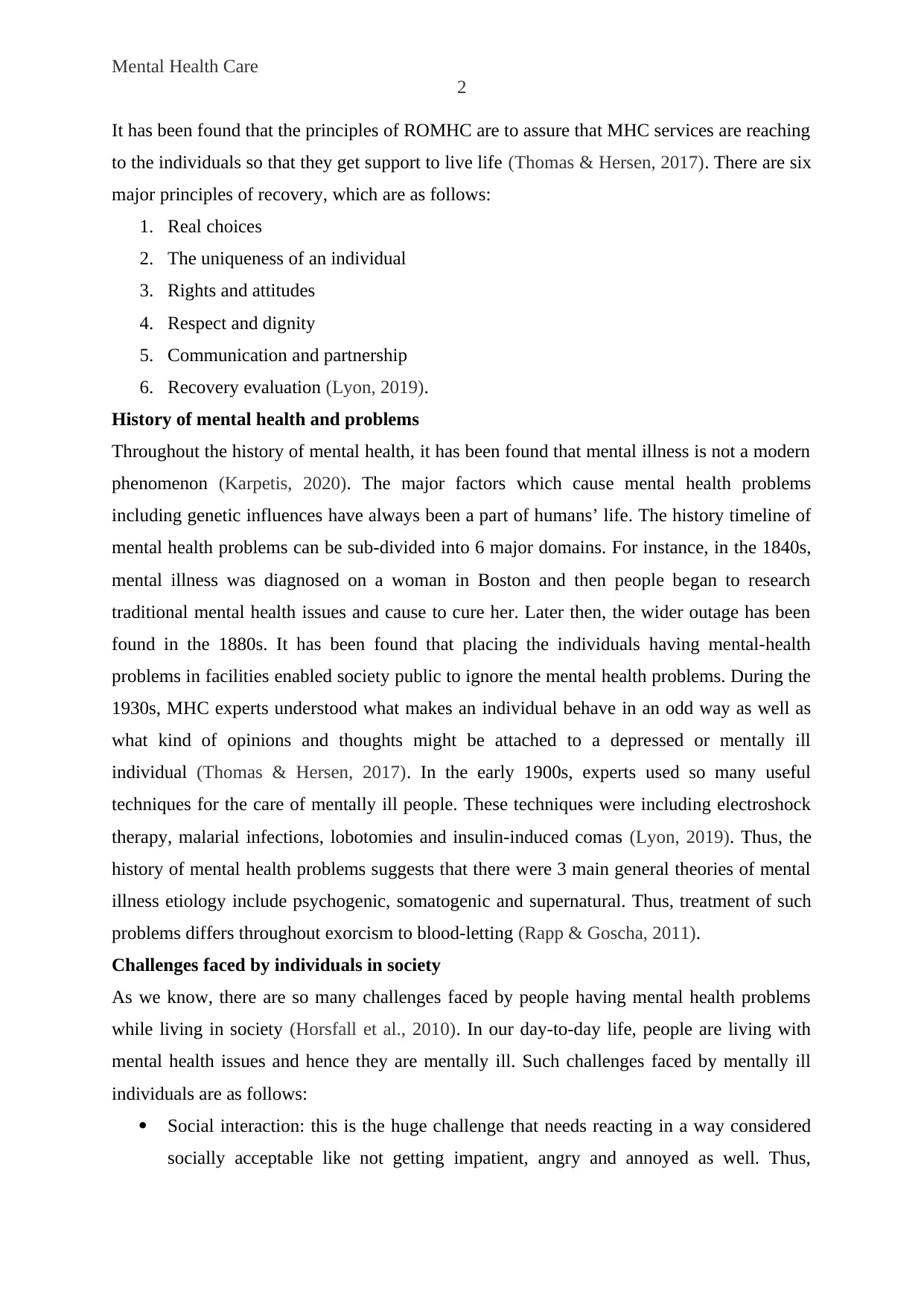
Mental Health Care
2
It has been found that the principles of ROMHC are to assure that MHC services are reaching
to the individuals so that they get support to live life (Thomas & Hersen, 2017). There are six
major principles of recovery, which are as follows:
1. Real choices
2. The uniqueness of an individual
3. Rights and attitudes
4. Respect and dignity
5. Communication and partnership
6. Recovery evaluation (Lyon, 2019).
History of mental health and problems
Throughout the history of mental health, it has been found that mental illness is not a modern
phenomenon (Karpetis, 2020). The major factors which cause mental health problems
including genetic influences have always been a part of humans’ life. The history timeline of
mental health problems can be sub-divided into 6 major domains. For instance, in the 1840s,
mental illness was diagnosed on a woman in Boston and then people began to research
traditional mental health issues and cause to cure her. Later then, the wider outage has been
found in the 1880s. It has been found that placing the individuals having mental-health
problems in facilities enabled society public to ignore the mental health problems. During the
1930s, MHC experts understood what makes an individual behave in an odd way as well as
what kind of opinions and thoughts might be attached to a depressed or mentally ill
individual (Thomas & Hersen, 2017). In the early 1900s, experts used so many useful
techniques for the care of mentally ill people. These techniques were including electroshock
therapy, malarial infections, lobotomies and insulin-induced comas (Lyon, 2019). Thus, the
history of mental health problems suggests that there were 3 main general theories of mental
illness etiology include psychogenic, somatogenic and supernatural. Thus, treatment of such
problems differs throughout exorcism to blood-letting (Rapp & Goscha, 2011).
Challenges faced by individuals in society
As we know, there are so many challenges faced by people having mental health problems
while living in society (Horsfall et al., 2010). In our day-to-day life, people are living with
mental health issues and hence they are mentally ill. Such challenges faced by mentally ill
individuals are as follows:
Social interaction: this is the huge challenge that needs reacting in a way considered
socially acceptable like not getting impatient, angry and annoyed as well. Thus,
2
It has been found that the principles of ROMHC are to assure that MHC services are reaching
to the individuals so that they get support to live life (Thomas & Hersen, 2017). There are six
major principles of recovery, which are as follows:
1. Real choices
2. The uniqueness of an individual
3. Rights and attitudes
4. Respect and dignity
5. Communication and partnership
6. Recovery evaluation (Lyon, 2019).
History of mental health and problems
Throughout the history of mental health, it has been found that mental illness is not a modern
phenomenon (Karpetis, 2020). The major factors which cause mental health problems
including genetic influences have always been a part of humans’ life. The history timeline of
mental health problems can be sub-divided into 6 major domains. For instance, in the 1840s,
mental illness was diagnosed on a woman in Boston and then people began to research
traditional mental health issues and cause to cure her. Later then, the wider outage has been
found in the 1880s. It has been found that placing the individuals having mental-health
problems in facilities enabled society public to ignore the mental health problems. During the
1930s, MHC experts understood what makes an individual behave in an odd way as well as
what kind of opinions and thoughts might be attached to a depressed or mentally ill
individual (Thomas & Hersen, 2017). In the early 1900s, experts used so many useful
techniques for the care of mentally ill people. These techniques were including electroshock
therapy, malarial infections, lobotomies and insulin-induced comas (Lyon, 2019). Thus, the
history of mental health problems suggests that there were 3 main general theories of mental
illness etiology include psychogenic, somatogenic and supernatural. Thus, treatment of such
problems differs throughout exorcism to blood-letting (Rapp & Goscha, 2011).
Challenges faced by individuals in society
As we know, there are so many challenges faced by people having mental health problems
while living in society (Horsfall et al., 2010). In our day-to-day life, people are living with
mental health issues and hence they are mentally ill. Such challenges faced by mentally ill
individuals are as follows:
Social interaction: this is the huge challenge that needs reacting in a way considered
socially acceptable like not getting impatient, angry and annoyed as well. Thus,
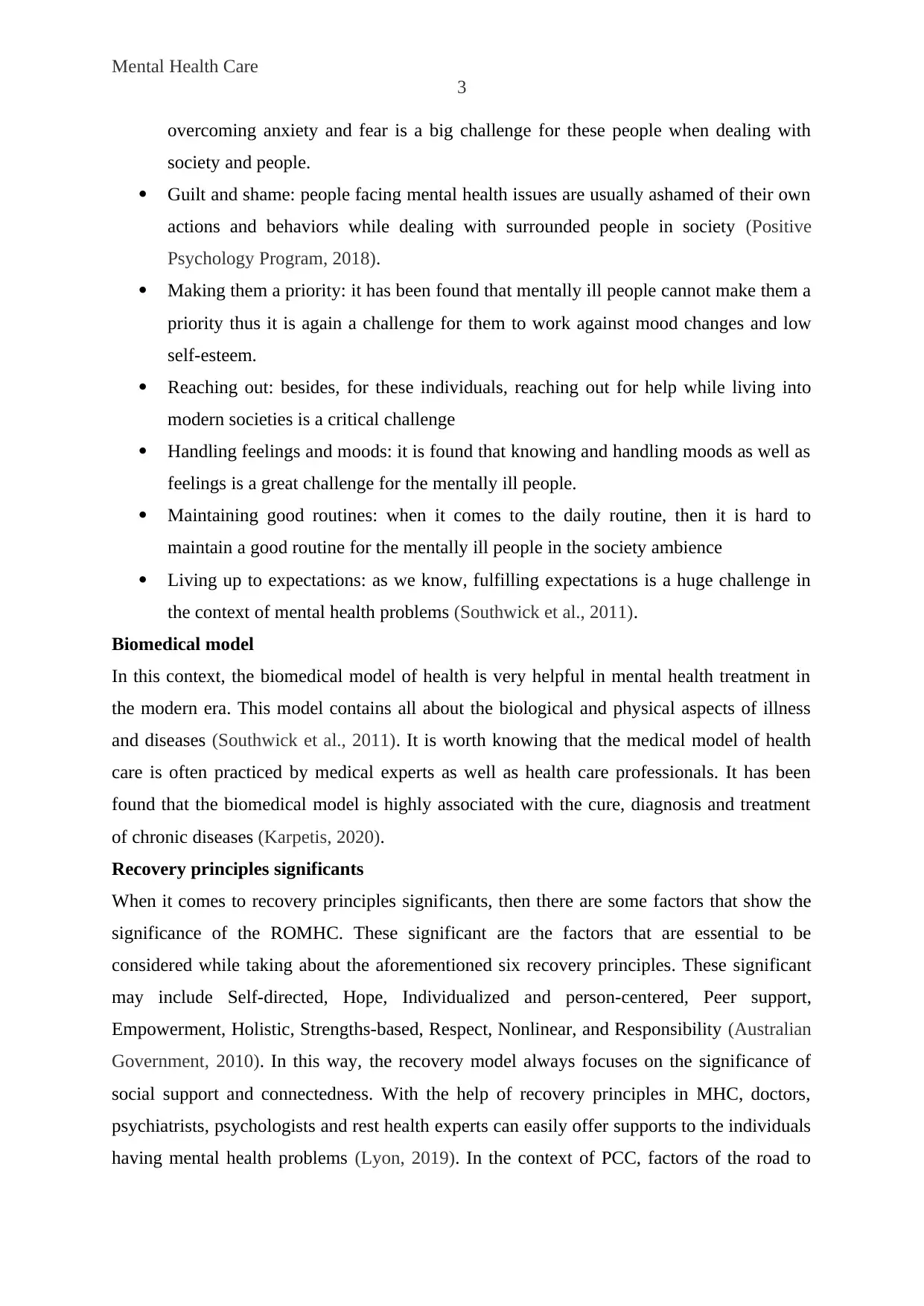
Mental Health Care
3
overcoming anxiety and fear is a big challenge for these people when dealing with
society and people.
Guilt and shame: people facing mental health issues are usually ashamed of their own
actions and behaviors while dealing with surrounded people in society (Positive
Psychology Program, 2018).
Making them a priority: it has been found that mentally ill people cannot make them a
priority thus it is again a challenge for them to work against mood changes and low
self-esteem.
Reaching out: besides, for these individuals, reaching out for help while living into
modern societies is a critical challenge
Handling feelings and moods: it is found that knowing and handling moods as well as
feelings is a great challenge for the mentally ill people.
Maintaining good routines: when it comes to the daily routine, then it is hard to
maintain a good routine for the mentally ill people in the society ambience
Living up to expectations: as we know, fulfilling expectations is a huge challenge in
the context of mental health problems (Southwick et al., 2011).
Biomedical model
In this context, the biomedical model of health is very helpful in mental health treatment in
the modern era. This model contains all about the biological and physical aspects of illness
and diseases (Southwick et al., 2011). It is worth knowing that the medical model of health
care is often practiced by medical experts as well as health care professionals. It has been
found that the biomedical model is highly associated with the cure, diagnosis and treatment
of chronic diseases (Karpetis, 2020).
Recovery principles significants
When it comes to recovery principles significants, then there are some factors that show the
significance of the ROMHC. These significant are the factors that are essential to be
considered while taking about the aforementioned six recovery principles. These significant
may include Self-directed, Hope, Individualized and person-centered, Peer support,
Empowerment, Holistic, Strengths-based, Respect, Nonlinear, and Responsibility (Australian
Government, 2010). In this way, the recovery model always focuses on the significance of
social support and connectedness. With the help of recovery principles in MHC, doctors,
psychiatrists, psychologists and rest health experts can easily offer supports to the individuals
having mental health problems (Lyon, 2019). In the context of PCC, factors of the road to
3
overcoming anxiety and fear is a big challenge for these people when dealing with
society and people.
Guilt and shame: people facing mental health issues are usually ashamed of their own
actions and behaviors while dealing with surrounded people in society (Positive
Psychology Program, 2018).
Making them a priority: it has been found that mentally ill people cannot make them a
priority thus it is again a challenge for them to work against mood changes and low
self-esteem.
Reaching out: besides, for these individuals, reaching out for help while living into
modern societies is a critical challenge
Handling feelings and moods: it is found that knowing and handling moods as well as
feelings is a great challenge for the mentally ill people.
Maintaining good routines: when it comes to the daily routine, then it is hard to
maintain a good routine for the mentally ill people in the society ambience
Living up to expectations: as we know, fulfilling expectations is a huge challenge in
the context of mental health problems (Southwick et al., 2011).
Biomedical model
In this context, the biomedical model of health is very helpful in mental health treatment in
the modern era. This model contains all about the biological and physical aspects of illness
and diseases (Southwick et al., 2011). It is worth knowing that the medical model of health
care is often practiced by medical experts as well as health care professionals. It has been
found that the biomedical model is highly associated with the cure, diagnosis and treatment
of chronic diseases (Karpetis, 2020).
Recovery principles significants
When it comes to recovery principles significants, then there are some factors that show the
significance of the ROMHC. These significant are the factors that are essential to be
considered while taking about the aforementioned six recovery principles. These significant
may include Self-directed, Hope, Individualized and person-centered, Peer support,
Empowerment, Holistic, Strengths-based, Respect, Nonlinear, and Responsibility (Australian
Government, 2010). In this way, the recovery model always focuses on the significance of
social support and connectedness. With the help of recovery principles in MHC, doctors,
psychiatrists, psychologists and rest health experts can easily offer supports to the individuals
having mental health problems (Lyon, 2019). In the context of PCC, factors of the road to
Secure Best Marks with AI Grader
Need help grading? Try our AI Grader for instant feedback on your assignments.
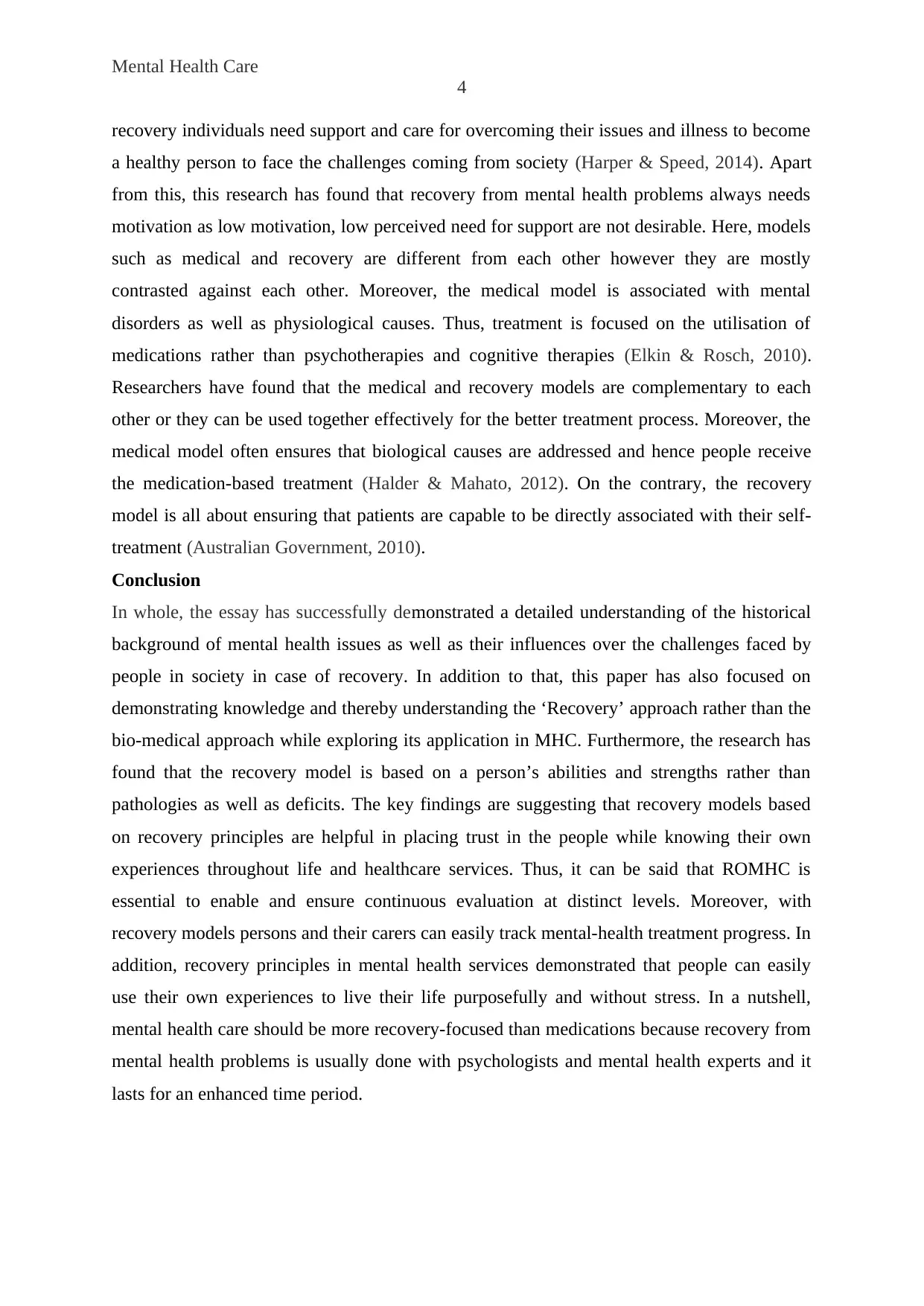
Mental Health Care
4
recovery individuals need support and care for overcoming their issues and illness to become
a healthy person to face the challenges coming from society (Harper & Speed, 2014). Apart
from this, this research has found that recovery from mental health problems always needs
motivation as low motivation, low perceived need for support are not desirable. Here, models
such as medical and recovery are different from each other however they are mostly
contrasted against each other. Moreover, the medical model is associated with mental
disorders as well as physiological causes. Thus, treatment is focused on the utilisation of
medications rather than psychotherapies and cognitive therapies (Elkin & Rosch, 2010).
Researchers have found that the medical and recovery models are complementary to each
other or they can be used together effectively for the better treatment process. Moreover, the
medical model often ensures that biological causes are addressed and hence people receive
the medication-based treatment (Halder & Mahato, 2012). On the contrary, the recovery
model is all about ensuring that patients are capable to be directly associated with their self-
treatment (Australian Government, 2010).
Conclusion
In whole, the essay has successfully demonstrated a detailed understanding of the historical
background of mental health issues as well as their influences over the challenges faced by
people in society in case of recovery. In addition to that, this paper has also focused on
demonstrating knowledge and thereby understanding the ‘Recovery’ approach rather than the
bio-medical approach while exploring its application in MHC. Furthermore, the research has
found that the recovery model is based on a person’s abilities and strengths rather than
pathologies as well as deficits. The key findings are suggesting that recovery models based
on recovery principles are helpful in placing trust in the people while knowing their own
experiences throughout life and healthcare services. Thus, it can be said that ROMHC is
essential to enable and ensure continuous evaluation at distinct levels. Moreover, with
recovery models persons and their carers can easily track mental-health treatment progress. In
addition, recovery principles in mental health services demonstrated that people can easily
use their own experiences to live their life purposefully and without stress. In a nutshell,
mental health care should be more recovery-focused than medications because recovery from
mental health problems is usually done with psychologists and mental health experts and it
lasts for an enhanced time period.
4
recovery individuals need support and care for overcoming their issues and illness to become
a healthy person to face the challenges coming from society (Harper & Speed, 2014). Apart
from this, this research has found that recovery from mental health problems always needs
motivation as low motivation, low perceived need for support are not desirable. Here, models
such as medical and recovery are different from each other however they are mostly
contrasted against each other. Moreover, the medical model is associated with mental
disorders as well as physiological causes. Thus, treatment is focused on the utilisation of
medications rather than psychotherapies and cognitive therapies (Elkin & Rosch, 2010).
Researchers have found that the medical and recovery models are complementary to each
other or they can be used together effectively for the better treatment process. Moreover, the
medical model often ensures that biological causes are addressed and hence people receive
the medication-based treatment (Halder & Mahato, 2012). On the contrary, the recovery
model is all about ensuring that patients are capable to be directly associated with their self-
treatment (Australian Government, 2010).
Conclusion
In whole, the essay has successfully demonstrated a detailed understanding of the historical
background of mental health issues as well as their influences over the challenges faced by
people in society in case of recovery. In addition to that, this paper has also focused on
demonstrating knowledge and thereby understanding the ‘Recovery’ approach rather than the
bio-medical approach while exploring its application in MHC. Furthermore, the research has
found that the recovery model is based on a person’s abilities and strengths rather than
pathologies as well as deficits. The key findings are suggesting that recovery models based
on recovery principles are helpful in placing trust in the people while knowing their own
experiences throughout life and healthcare services. Thus, it can be said that ROMHC is
essential to enable and ensure continuous evaluation at distinct levels. Moreover, with
recovery models persons and their carers can easily track mental-health treatment progress. In
addition, recovery principles in mental health services demonstrated that people can easily
use their own experiences to live their life purposefully and without stress. In a nutshell,
mental health care should be more recovery-focused than medications because recovery from
mental health problems is usually done with psychologists and mental health experts and it
lasts for an enhanced time period.
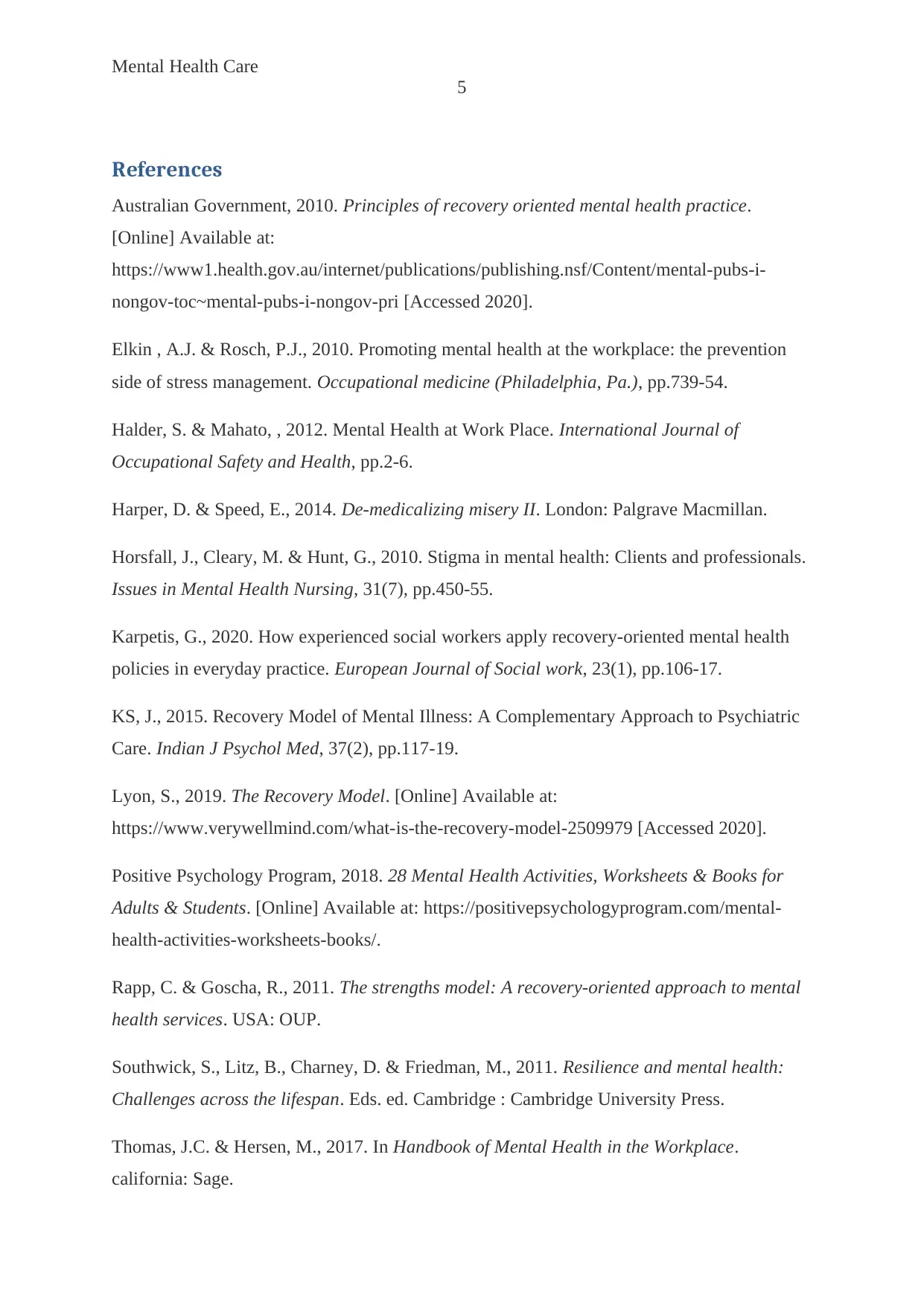
Mental Health Care
5
References
Australian Government, 2010. Principles of recovery oriented mental health practice.
[Online] Available at:
https://www1.health.gov.au/internet/publications/publishing.nsf/Content/mental-pubs-i-
nongov-toc~mental-pubs-i-nongov-pri [Accessed 2020].
Elkin , A.J. & Rosch, P.J., 2010. Promoting mental health at the workplace: the prevention
side of stress management. Occupational medicine (Philadelphia, Pa.), pp.739-54.
Halder, S. & Mahato, , 2012. Mental Health at Work Place. International Journal of
Occupational Safety and Health, pp.2-6.
Harper, D. & Speed, E., 2014. De-medicalizing misery II. London: Palgrave Macmillan.
Horsfall, J., Cleary, M. & Hunt, G., 2010. Stigma in mental health: Clients and professionals.
Issues in Mental Health Nursing, 31(7), pp.450-55.
Karpetis, G., 2020. How experienced social workers apply recovery-oriented mental health
policies in everyday practice. European Journal of Social work, 23(1), pp.106-17.
KS, J., 2015. Recovery Model of Mental Illness: A Complementary Approach to Psychiatric
Care. Indian J Psychol Med, 37(2), pp.117-19.
Lyon, S., 2019. The Recovery Model. [Online] Available at:
https://www.verywellmind.com/what-is-the-recovery-model-2509979 [Accessed 2020].
Positive Psychology Program, 2018. 28 Mental Health Activities, Worksheets & Books for
Adults & Students. [Online] Available at: https://positivepsychologyprogram.com/mental-
health-activities-worksheets-books/.
Rapp, C. & Goscha, R., 2011. The strengths model: A recovery-oriented approach to mental
health services. USA: OUP.
Southwick, S., Litz, B., Charney, D. & Friedman, M., 2011. Resilience and mental health:
Challenges across the lifespan. Eds. ed. Cambridge : Cambridge University Press.
Thomas, J.C. & Hersen, M., 2017. In Handbook of Mental Health in the Workplace.
california: Sage.
5
References
Australian Government, 2010. Principles of recovery oriented mental health practice.
[Online] Available at:
https://www1.health.gov.au/internet/publications/publishing.nsf/Content/mental-pubs-i-
nongov-toc~mental-pubs-i-nongov-pri [Accessed 2020].
Elkin , A.J. & Rosch, P.J., 2010. Promoting mental health at the workplace: the prevention
side of stress management. Occupational medicine (Philadelphia, Pa.), pp.739-54.
Halder, S. & Mahato, , 2012. Mental Health at Work Place. International Journal of
Occupational Safety and Health, pp.2-6.
Harper, D. & Speed, E., 2014. De-medicalizing misery II. London: Palgrave Macmillan.
Horsfall, J., Cleary, M. & Hunt, G., 2010. Stigma in mental health: Clients and professionals.
Issues in Mental Health Nursing, 31(7), pp.450-55.
Karpetis, G., 2020. How experienced social workers apply recovery-oriented mental health
policies in everyday practice. European Journal of Social work, 23(1), pp.106-17.
KS, J., 2015. Recovery Model of Mental Illness: A Complementary Approach to Psychiatric
Care. Indian J Psychol Med, 37(2), pp.117-19.
Lyon, S., 2019. The Recovery Model. [Online] Available at:
https://www.verywellmind.com/what-is-the-recovery-model-2509979 [Accessed 2020].
Positive Psychology Program, 2018. 28 Mental Health Activities, Worksheets & Books for
Adults & Students. [Online] Available at: https://positivepsychologyprogram.com/mental-
health-activities-worksheets-books/.
Rapp, C. & Goscha, R., 2011. The strengths model: A recovery-oriented approach to mental
health services. USA: OUP.
Southwick, S., Litz, B., Charney, D. & Friedman, M., 2011. Resilience and mental health:
Challenges across the lifespan. Eds. ed. Cambridge : Cambridge University Press.
Thomas, J.C. & Hersen, M., 2017. In Handbook of Mental Health in the Workplace.
california: Sage.

Mental Health Care
6
6
Paraphrase This Document
Need a fresh take? Get an instant paraphrase of this document with our AI Paraphraser

Mental Health Care
7
7
1 out of 8
Related Documents
Your All-in-One AI-Powered Toolkit for Academic Success.
+13062052269
info@desklib.com
Available 24*7 on WhatsApp / Email
![[object Object]](/_next/static/media/star-bottom.7253800d.svg)
Unlock your academic potential
© 2024 | Zucol Services PVT LTD | All rights reserved.





